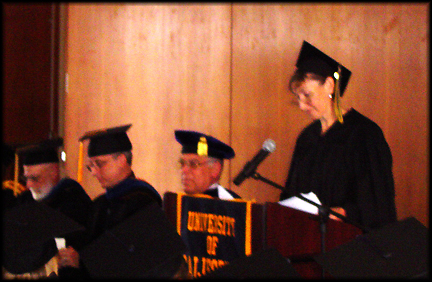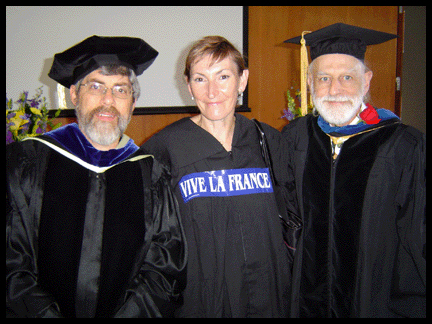On May 15, 2004, Brigitte Niquette graduated with honors from the University of California, Berkeley, receiving her Bachelor of Arts degree in Linguistics and delivered the valedictory address for her class.First of all, I want to say how deeply moved I am that my fellow undergraduates have chosen me to speak in their name, and I would like to express to all of them my gratitude for giving me this great opportunity to be here today. I want also to thank our friends and family members who, because they have supported our efforts, witnessed our doubts, followed with enthusiasm our progress, deserve to share this celebration with us. I am also thankful to all the professors who have had the patience to listen to our questions, to read our endless papers, to correct our mistakes, and yet, I can see that they have forgiven us, because they are all here. Finally, and I am sure that all the students will agree with me, I am grateful to Esther Weiss, our gracious guide through the administrative labyrinth, without whom our undergraduate life would have been a nightmare out of Kafka. We students know that our graduation party is your graduation party -- to you all -- because without your contribution our success would not have been possible.
As an undergraduate, considering the scope of Linguistics may give the vertigo but confronting its premises is absolutely exhilarating. Not only Linguistics engages us to a wide fane of other disciplines, let me, just for the sake of it, name only a few research/education in Linguistics subfields: Neuroscience and Psychology, Research/Education in first or second language acquisition and Literacy, Information technology and Mass communication, Law and Politics Literature and Computer Sciences. Well, there are so many options that the 10 minutes allocated for this speech would not be enough to name them all. But more, because Linguistics -- the study of the rules of language -- is the essence of our humanity, it resides at the heart of our daily life and, as such, is the most essential resource for throwing ourselves with confidence into the world and, above all, for surviving free in it. So it is fair to say that, more than with any other discipline, one can do everything he or she wants with a BA in Linguistics, an achievement which is not an end in itself but the commencement of something else, because what we know of Linguistics -- as little as it may be -- multiplies our potential. What follows from the multi-faceted aspect of Linguistics is that there is not one but as many students experiences as there are students in the Linguistic Department. If students are all confronted with anxiety to the freedom that Linguistics gives them, if they all regret not to have enough time to embrace all the courses the department offers, it is they -- and not the curriculum -- who decide to mold their studies, to take the direction that fits best their interest. This is what makes Linguistics at UC Berkeley so fascinating and so unique: not only studying but also meeting people cohering in the discovery of Linguistics while getting involved in a wide diversity of experiences and researches. Having so much diversity in the students' body is not something which occurs just like that, randomly. It springs from the Faculty’s qualities to share, to reveal without pressure, to lead the students to the manifold prospects Linguistics offers. There is in the Linguistics Faculty an extraordinary willingness to include people, not in a closed exclusive club of those who know, but in a community of individuals contributing to the same endeavor. This is the feeling I have without exception with all my professors and my fellow students are here to corroborate that they share that same feeling for the Faculty members with whom they have been working. That willingness of the Faculty to embrace undergraduate students in its work is what makes me feel at home when I am in the Linguistics Department. For the visitor this willingness is manifest on the photo-panelle displaying the snapshots of all students -- graduates and undergraduates -- beside those of the Faculty, all gathered, smiling and at their best, as if in a big family portrait. Now, since I graduated in December 2003, I have had a little bit of time to think about this photo-panelle and one day, I had an epiphany. While recovering from several semesters of Linguistics studies, I suddenly realized that beside altruism, there may be another reason justifying the existence of this photo-panelle, reason imposed by necessity and the harshness of life. You see, if ever you believe that studying Linguistics is a piece of cake, you are wrong. It is a fact well known among the faculty members that long before the middle of each semester they have to avoid flocks of undergraduates completely anesthesized by too much work and sleepless nights, wandering, drawn, haggard, and so completely worn-down that they bump and ricochet against the walls of the corridor of the Linguistics Department, making the place somewhat hazardous. Believe me, parents and friends, before the end of the semester your dear little student of Linguistics is no more than the shadow of himself or herself, barely recognizable. Happily, there is the photo-panelle, on which each jovial portrait, though hardly the souvenir of what the person once was, makes it possible for the faculty, once the transformation has taken place, to keep track of who is who. Fortunately for us undergraduates, the physical change to which we have been subjected is only the corollary of work, something from which we all eventually recover. But considering what we are taking with us -- the capacity for knowledge acquisition -- studying Linguistics at UC Berkeley was not only worth the effort, but it was a time that we will cherish forever because, thanks to all of you, it has already changed our life.
|
 Now,
if you expect me, in this speech, to explain what Linguistics is, I am
sorry to tell you that I am not going to do that. What I prefer to
do is to give you a feeling of what it is to be a student of Linguistics
at UC Berkeley and how big a privilege it is to graduate from this unique
department. There are two reasons for which I will not give an explanation
of Linguistics. The first one is that there are too many people in
this audience who are much more knowledgeable than I am on the subject
to do it in my place. The second reason is that it would be presumptuous
to say that undergraduating in Linguistics makes you a Linguist.
Linguistics is such a fundamental discipline that the undergraduate studies
merely unveil the curtain concealing the vastness of Linguistics. Being
an undergraduate in Linguistics is like climbing the foothills leading
to a mountain that, once you have your nose on it, you realize big, steep,
full of crevices or sharp bumps but hiding exciting secrets and possible
discoveries.
Now,
if you expect me, in this speech, to explain what Linguistics is, I am
sorry to tell you that I am not going to do that. What I prefer to
do is to give you a feeling of what it is to be a student of Linguistics
at UC Berkeley and how big a privilege it is to graduate from this unique
department. There are two reasons for which I will not give an explanation
of Linguistics. The first one is that there are too many people in
this audience who are much more knowledgeable than I am on the subject
to do it in my place. The second reason is that it would be presumptuous
to say that undergraduating in Linguistics makes you a Linguist.
Linguistics is such a fundamental discipline that the undergraduate studies
merely unveil the curtain concealing the vastness of Linguistics. Being
an undergraduate in Linguistics is like climbing the foothills leading
to a mountain that, once you have your nose on it, you realize big, steep,
full of crevices or sharp bumps but hiding exciting secrets and possible
discoveries.
